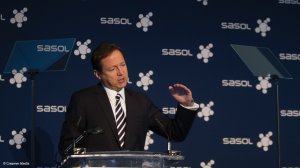Despite the lower-for-much-longer oil price outlook, integrated chemicals and energy company Sasol is remaining focused on executing growth projects in Southern Africa and North America as part of a dual regional strategy.
In presenting 63%-lower earnings attributable to shareholders in the six months to December 31, outgoing Sasol CEO David Constable gave details of Sasol’s expansion in neighbouring Mozambique, where it had obtained Council of Ministers’ approval for a field development plan that would monetise more hydrocarbon resources in support of Southern Africa’s growth objectives. (Also watch attached Creamer Media video).
“The Mozambican gas industry is playing an increasingly important role in the regional energy landscape,” Constable said at the company’s latest presentation of financial results, attended by Creamer Media’s Engineering News Online.
The production agreement’s $1.4-billion first phase involved an integrated oil, liquefied petroleum gas and gas project next to the company’s existing production agreement area.
Against that background, R2.7-billion was being invested in the Loop Line 2 natural gas pipeline project to increase the capacity of the Mozambique-to-South Africa gas pipeline to 191-billion cubic feet a year from the second half of this year.
In South Africa, beneficial operation was expected at the Shondoni coal project in Mpumalanga in the first half of this year and at the R13.6-billion second-phase Sasolburg wax expansion in the first half of 2017.
In the United States, $3.7-billion had been invested to date in the ethane cracker and downstream derivatives complex at Lake Charles, where detailed engineering was advanced and underground civil work was nearing completion.
To support the company’s response plan to the lower oil price, the decision had been taken to pace the execution of the cracker project, with the proposed schedule extension expected to optimise field efficiency still further and limit the spend rate.
A phased commissioning of the cracker was expected in 2018 and full beneficial operation of the smaller derivatives units in 2019.
“By optimising cash flows, we’re managing our gearing and credit rating, ensuring continued balance sheet strength, protecting our dividend policy and driving resilient earnings,” said Constable – who will be succeeded by joint CEOs Bongani Nqwababa and Stephen Cornell on July 1.
The dual strategy was designed to augment Sasol’s other business activities in Eurasia, Middle East and the rest of Africa.
Overall, the company was going all out to ensure that its balance sheet and earnings remained resilient at an oil price of $30/bl.
Edited by: Creamer Media Reporter
EMAIL THIS ARTICLE SAVE THIS ARTICLE
To subscribe email subscriptions@creamermedia.co.za or click here
To advertise email advertising@creamermedia.co.za or click here












